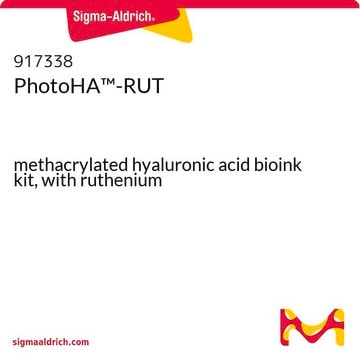About This Item
Código UNSPSC:
12162002
NACRES:
NA.23
Produtos recomendados
composição
Ruthenium (200 mg)
Sodium persulfate photoinitiator (1 g)
Nível de qualidade
Aplicação
Ruthenium is a photoinitiator that utilizes visible light photocrosslinking (400-450nm) to covalently crosslink free tyrosine and acryl groups. Ruthenium photoinitiator has been tested on collagen type I, gelatin, silk fibroin, methacrylated hyaluronic acid, methacrylated gelatin, methacrylated collagen type I and PEGDA. Ruthenium is water soluble and yields better cytocompatibility, and crosslinking efficiency. Ruthenium is red/yellow/orange in color and will change the color of your solutions, hydrogels, or printed constructs. The Ruthenium photoinitiator kit is non-sterile. Adding antibiotics to your cell culture system, or sterile filtering is recommended. To sterile filter, resuspend the entire volume of ruthenium and Sodium persulfate (separately) and filter through small 0.2 micron button filters (separately). Use the sterile photoinitiator within 2 weeks. Ruthenium photoinitiator kit is ideal for tissue engineering, cell culture, and bioprinting, where tuning the mechanical properties of the substrate is required. The kit provides enough photoinitiator for >200 mL of bioinks/hydrogels.
Palavra indicadora
Danger
Frases de perigo
Declarações de precaução
Classificações de perigo
Acute Tox. 4 Oral - Ox. Sol. 3 - Resp. Sens. 1 - Skin Irrit. 2 - Skin Sens. 1 - STOT SE 3
Órgãos-alvo
Respiratory system
Código de classe de armazenamento
5.1B - Oxidizing hazardous materials
Certificados de análise (COA)
Busque Certificados de análise (COA) digitando o Número do Lote do produto. Os números de lote e remessa podem ser encontrados no rótulo de um produto após a palavra “Lot” ou “Batch”.
Já possui este produto?
Encontre a documentação dos produtos que você adquiriu recentemente na biblioteca de documentos.
J D Parker et al.
The bone & joint journal, 100-B(3), 404-412 (2018-03-29)
The intra-articular administration of tranexamic acid (TXA) has been shown to be effective in reducing blood loss in unicompartmental knee arthroplasty and anterior cruciate reconstruction. The effects on human articular cartilage, however, remains unknown. Our aim, in this study, was
Automated 3D bioassembly of micro-tissues for biofabrication of hybrid tissue engineered constructs.
N V Mekhileri et al.
Biofabrication, 10(2), 024103-024103 (2017-12-05)
Bottom-up biofabrication approaches combining micro-tissue fabrication techniques with extrusion-based 3D printing of thermoplastic polymer scaffolds are emerging strategies in tissue engineering. These biofabrication strategies support native self-assembly mechanisms observed in developmental stages of tissue or organoid growth as well as
J Parrish et al.
Lab on a chip, 18(18), 2757-2775 (2018-08-18)
Traditional 2D monolayer cell cultures and submillimeter 3D tissue construct cultures used widely in tissue engineering are limited in their ability to extrapolate experimental data to predict in vivo responses due to their simplistic organization and lack of stimuli. The
Sarah Bertlein et al.
Advanced materials (Deerfield Beach, Fla.), 29(44) (2017-10-19)
Bioprinting can be defined as the art of combining materials and cells to fabricate designed, hierarchical 3D hybrid constructs. Suitable materials, so called bioinks, have to comply with challenging rheological processing demands and rapidly form a stable hydrogel postprinting in
Khoon S Lim et al.
Biofabrication, 10(3), 034101-034101 (2018-04-26)
Lithography-based three-dimensional (3D) printing technologies allow high spatial resolution that exceeds that of typical extrusion-based bioprinting approaches, allowing to better mimic the complex architecture of biological tissues. Additionally, lithographic printing via digital light processing (DLP) enables fabrication of free-form lattice
Nossa equipe de cientistas tem experiência em todas as áreas de pesquisa, incluindo Life Sciences, ciência de materiais, síntese química, cromatografia, química analítica e muitas outras.
Entre em contato com a assistência técnica










